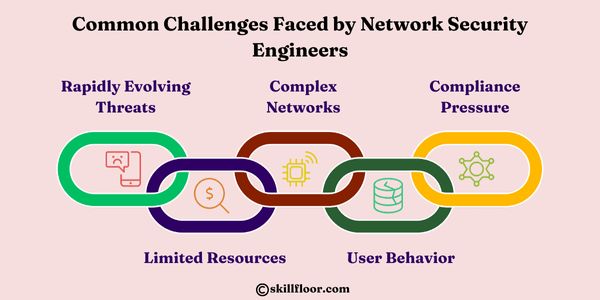Network Security Engineer Roles and Responsibilities Guide
Explore the roles, responsibilities, skills, career paths, and salary of network security engineers. Learn how they protect organizational networks and ensure cybersecurity.

Businesses and organizations in the current digital era mostly depend on computer networks to run smoothly, handle sensitive data, and interact with teams and clients. With this dependence comes a growing risk of cyber threats, data breaches, and unauthorized access, which can have significant financial, operational, and reputational consequences. As technology advances, securing networks has become a critical priority for organizations of all sizes and industries, ensuring that digital assets remain protected and operations continue without interruption.
Network security has therefore emerged as a vital component of modern IT infrastructure. Specialists in this field are responsible for implementing security measures, monitoring network activity, and mitigating risks to safeguard information. Their work encompasses designing secure systems, managing protective tools, responding to incidents, and ensuring compliance with regulations. Understanding the roles and responsibilities of network security professionals is crucial for organizations seeking to establish robust, resilient, and secure digital environments.
Who is a Network Security Engineer?
A Network Security Engineer is an IT professional who focuses on protecting an organization’s network infrastructure. Unlike general network engineers who primarily handle connectivity and performance, network security engineers specialize in monitoring, defending, and maintaining secure networks. They design, implement, and manage security measures that prevent unauthorized access, data breaches, malware attacks, and other cyber threats.
The role is dynamic, blending technical expertise with strategic planning, risk assessment, and compliance management. These professionals ensure that the network operates efficiently while adhering to organizational and regulatory security standards.
Importance of Network Security Engineers
The digital transformation of businesses has expanded the attack surface, making networks more vulnerable than ever. Network security engineers play a crucial role in:
- Protecting Sensitive Data: Ensuring that personal, financial, and proprietary data is safe from unauthorized access.
- Maintaining Business Continuity: Preventing disruptions caused by cyber-attacks or system failures.
- Regulatory Compliance: Ensuring that the organization complies with standards such as GDPR, HIPAA, or ISO 27001.
- Mitigating Threats: Identifying vulnerabilities, deploying defenses, and monitoring for suspicious activity.
Organizations rely on these professionals to build a robust security posture that not only prevents attacks but also minimizes the impact of potential security incidents.
Key Roles of a Network Security Engineer
The responsibilities of a network security engineer can be grouped into several core areas. Each area requires specialized knowledge and hands-on experience with security tools and protocols.
1. Designing and Implementing Network Security Solutions
Network security engineers are responsible for designing security architectures tailored to the organization’s needs. This includes:
- Developing firewall policies and access control lists (ACLs).
- Implementing VPNs for secure remote access.
- Designing intrusion detection and prevention systems (IDPS).
- Configuring secure network devices like routers, switches, and wireless access points.
They ensure that security measures are not only effective but also scalable and adaptable to evolving threats.
2. Monitoring and Analyzing Network Traffic
Continuous monitoring is essential to detect suspicious activity or potential breaches. Responsibilities include:
- Using Security Information and Event Management (SIEM) tools to analyze network logs.
- Identifying anomalies that could indicate a cyber threat.
- Performing regular vulnerability assessments and penetration testing.
Monitoring allows engineers to respond quickly to incidents, reducing the likelihood of data loss or downtime.
3. Incident Response and Threat Mitigation
When a security breach occurs, network security engineers take immediate action to contain and mitigate damage. This involves:
- Identifying the source and extent of the breach.
- Isolating affected systems to prevent further spread.
- Removing malware or unauthorized access points.
- Collaborating with incident response teams to restore normal operations.
Incident response planning is a critical component of risk management, and engineers often work closely with IT teams to create and update these plans.
4. Managing Security Tools and Infrastructure
Network security engineers maintain a variety of tools and infrastructure components to protect organizational assets. This includes:
- Firewalls, intrusion detection/prevention systems, and antivirus software.
- Network monitoring tools like Wireshark or SolarWinds.
- Authentication and encryption systems such as VPNs, SSL/TLS, and multi-factor authentication (MFA).
Regular updates, patches, and configurations are essential to ensure that these tools remain effective against emerging threats.
5. Policy Development and Compliance
Organizations must comply with regulatory requirements and industry best practices. Network security engineers contribute by:
- Drafting and enforcing security policies and procedures.
- Ensuring adherence to compliance standards such as ISO 27001, PCI DSS, HIPAA, or NIST guidelines.
- Conducting audits and generating reports for management or regulatory bodies.
Policy development ensures that security measures are standardized and consistently applied across the organization.
6. Collaboration and Training
Network security engineers don’t work in isolation. They collaborate with other IT teams, management, and sometimes external vendors. Responsibilities include:
- Coordinating with system administrators, software developers, and IT support teams.
- Educating employees about safe network practices and phishing prevention.
- Advising management on security risks and investment priorities.
Strong communication skills are essential to effectively convey complex technical concepts to non-technical stakeholders.
Essential Skills for Network Security Engineers
A network security engineer must combine technical expertise with analytical thinking and problem-solving abilities. Key skills include:
Technical Skills
- Network Protocols: TCP/IP, DNS, DHCP, and routing protocols.
- Firewall and VPN Configuration: Cisco, Fortinet, Palo Alto, or Juniper systems.
- Intrusion Detection and Prevention: Snort, Suricata, or similar tools.
- Security Monitoring Tools: SIEM platforms like Splunk, QRadar, or LogRhythm.
- Encryption and Authentication: SSL/TLS, VPNs, and MFA.
- Operating Systems: Linux, Windows Server, and network device OS.
Analytical Skills
- Threat analysis and risk assessment.
- Vulnerability scanning and penetration testing.
- Log analysis to detect anomalies or attacks.
- Strong communication and collaboration skills.
- Problem-solving under pressure during security incidents.
- Continuous learning mindset to keep up with evolving cyber threats.
Common Challenges Faced by Network Security Engineers
Network security engineers operate in a high-pressure environment. Common challenges include:
- Rapidly Evolving Threats: Cyber threats change constantly, requiring ongoing vigilance.
- Limited Resources: Budget constraints can limit the implementation of advanced security solutions.
- Complex Networks: Large organizations often have hybrid environments, making security management more complicated.
- User Behavior: Employees may inadvertently create vulnerabilities through unsafe practices.
- Compliance Pressure: Regulatory requirements are stringent, and non-compliance can result in heavy penalties.
Despite these challenges, network security engineers play a crucial role in minimizing risk and maintaining organizational trust.

Career Path and Opportunities
A career as a network security engineer offers strong growth potential, competitive salaries, and opportunities to work across industries. In India, the average salary for a network security engineer ranges from and typical career paths include:
- Junior Network Security Engineer: Entry-level role focusing on monitoring, incident response, and basic security configurations.
- Network Security Engineer: Mid-level role with responsibility for designing security solutions and managing infrastructure.
- Senior Security Engineer / Security Architect: Leadership roles involving strategy, advanced security design, and team management.
- Chief Information Security Officer (CISO): Executive-level role responsible for overall organizational security strategy.
Certifications such as CISSP, CEH, CompTIA Security+, CCNP Security, and vendor-specific credentials (Cisco, Palo Alto, Fortinet) significantly enhance career prospects.
Tools and Technologies Used
Network security engineers leverage a variety of tools and technologies, including:
- Firewalls: Cisco ASA, Fortinet FortiGate, Palo Alto.
- VPN Solutions: OpenVPN, Cisco AnyConnect.
- SIEM Tools: Splunk, IBM QRadar, LogRhythm.
- IDS/IPS: Snort, Suricata, Cisco Firepower.
- Endpoint Security: Symantec, McAfee, CrowdStrike.
- Network Monitoring: SolarWinds, PRTG Network Monitor, Nagios.
Proficiency in these tools enables engineers to proactively secure networks and respond effectively to incidents.
Future Trends in Network Security
The role of network security engineers is evolving rapidly with technology trends:
- Cloud Security: Protecting cloud infrastructure and hybrid networks.
- Zero Trust Architecture: Limiting access based on strict identity verification.
- AI and Machine Learning: Automating threat detection and response.
- IoT Security: Securing connected devices across networks.
- Cybersecurity Regulations: Increased compliance requirements globally.
Network security engineers must stay updated with these trends to remain effective and competitive.
Network security engineers are the backbone of organizational cybersecurity, safeguarding data, systems, and operations from an ever-expanding array of cyber threats. Their roles are multifaceted, encompassing network design, monitoring, incident response, policy development, and team collaboration. The position demands a mix of technical skills, analytical thinking, and strong communication abilities. As organizations continue to digitize and cyber threats grow more sophisticated, the demand for skilled network security engineers will only increase. For IT professionals looking to specialize, this career offers challenging yet rewarding opportunities, a clear growth path, and a chance to make a significant impact on organizational security. In essence, network security engineers are not just IT professionals—they are guardians of the digital realm, ensuring that the data and systems businesses rely on remain secure, resilient, and trustworthy.






























































